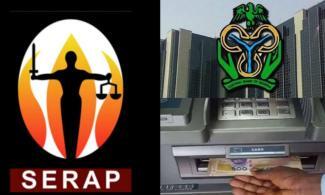The Socio-Economic Rights and Accountability Project (SERAP) has urged a Federal High Court in Lagos to stop the Central Bank of Nigeria (CBN) from implementing the recent increase in Automated Teller Machine (ATM) transaction fees.
SERAP, in the suit, which is yet to be assigned to a judge, is asking the court for an interim injunction to prevent the CBN, its officers, agents, associates, or any other individuals acting on its behalf from enforcing this decision until the motion for an interlocutory injunction is heard and determined.
The civil society organisation is also praying to the court to determine whether the CBN’s decision to increase ATM transaction fees is arbitrary, unfair, unreasonable, and contrary to the Federal Competition and Consumer Protection Act 2018 provisions.
The plaintiff further seeks a declaration from the court stating that the CBN’s decision to raise ATM transaction fees violates sections 1(c) and (d), 104, 105, and 127(1) of the Federal Competition and Consumer Protection Act 2018, which applies to the CBN.
SERAP said its lawsuit results from the CBN’s directive that ATM withdrawals made at a machine owned by a bank but located outside its branch will now incur a fee of N100 for every N20,000 withdrawn.
Additionally, the apex bank had also directed that withdrawals at shopping centres, airports, or standalone cash points will attract an N100 fee plus a surcharge of up to N500 for every N20,000 withdrawal.
In an affidavit attached to the suit, the plaintiff contends that the fee increase cannot be justified under the Nigerian Constitution (1999, as amended), the CBN Act, the Federal Competition and Consumer Protection Act, or Nigeria’s international human rights obligations.
SERAP also argues that the increase creates a two-tiered financial system that discriminates against poorer Nigerians who may struggle to afford the higher ATM fees. According to SERAP, this unjust increase contributes to human rights violations of socially and economically disadvantaged Nigerians.
The lawsuit, filed on behalf of the organisation’s lawyers Kolawole Oluwadare and Andrew Nwankwo, states: “The CBN is compromising its stated mission to manage the country’s economy and, ultimately, foster sustainable development.
“The CBN also fails to comply with the Nigerian Constitution, the Federal Competition and Consumer Protection Act, and the country’s international human rights obligations in exercising its state functions.
“The complaint emphasises that the financial burden of the ATM fee increase should be borne by affluent banks and their shareholders rather than the general public.
“CBN policies should not disadvantage poor Nigerians while favouring banks that continue to report trillions of naira in profits—often at the expense of their customers. The increase in ATM transaction fees would only exacerbate hardship for impoverished Nigerians and contribute to human rights abuses.
“Imposing exorbitant ATM transaction fees on socially and economically vulnerable individuals while many banks declare trillions of naira in annual profits is both manifestly unfair and unreasonable.
In a circular issued to all banks and financial institutions on February 10, 2025, the CBN stated that it has reviewed and increased the ATM transaction fees outlined in section 10(7) of the CBN Guide to Charges by Banks, Other Financial Institutions, and Non-Bank Financial Institutions 2020.
According to sections 1(c) and (d) of the Federal Competition and Consumer Protection Act 2018, the Act’s objectives are to protect and promote consumer interests and welfare and prohibit restrictive or unfair business practices, such as the CBN’s unreasonable increase in ATM transaction fees.
The provisions of the Federal Competition and Consumer Protection Act are binding on the CBN and govern the exercise of its statutory powers and functions.
Section 2(1) of the Act stipulates that its provisions apply to all undertakings—including the CBN—and are relevant to all commercial activities within Nigeria.
Section 2(2) further states that the Act is binding on (a) corporate bodies or agencies of the Government, (b) corporate entities, and (c) all commercial activities aimed at profit generation and catering to public demand.
As per section 70(1) of the Act, an undertaking such as the CBN is considered dominant if it can operate without regard for customer reactions.
The Act prohibits the CBN from abusing dominant market positions, including imposing excessive ATM transaction fees that harm consumers.
We’ve Finalised 2025 Hajj Operations Preparations – NAHCON
The National Hajj Commission of Nigeria (NAHCON) has announced that it has finalised all preparations for the 2025 Hajj operations and is set to ensure a smooth and successful pilgrimage.
The commission’s chairman, Professor Abdullahi Seleh Usman, announced this after signing an amended contract with Mashariq Al Dhahabia. This Saudi-based company will provide services for Nigerian pilgrims during the 2025 Hajj.
The ceremony for signing the amended contract took place over the weekend, following a visit to the NAHCON headquarters at the Hajj House in Abuja by a delegation from the Saudi-based service provider, led by its chairman, Muhammad Hassan.
Professor Usman assured prospective Nigerian pilgrims that the commission is fully prepared to conduct a seamless and successful Hajj operation, dismissing any claims regarding contract cancellation.
“I would like to take this opportunity to assure all intending Nigerian pilgrims for this year’s Hajj that the commission has concluded all arrangements for a smooth and successful operation by the grace of Allah. Any contrary information is unknown to the commission, and we have not cancelled any contracts with any company,” he stated.
Regarding signing the amended contract with the Saudi firm, the NAHCON chairman explained that the adjustment was necessary to clarify ambiguities in the original agreement and facilitate efficient Hajj operations.











